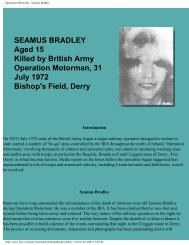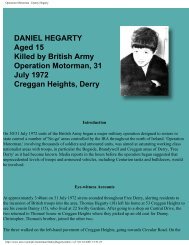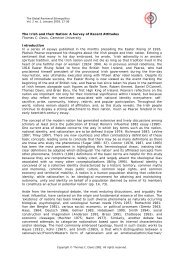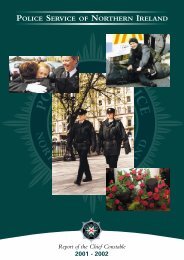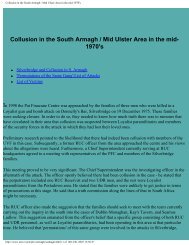7 POLICING WITH THE COMMUNITY - CAIN
7 POLICING WITH THE COMMUNITY - CAIN
7 POLICING WITH THE COMMUNITY - CAIN
Create successful ePaper yourself
Turn your PDF publications into a flip-book with our unique Google optimized e-Paper software.
7.16 We recommend that the Northern Ireland police should, both at a service-wide level and at patrolteam level, conduct crime pattern and complaint pattern analysis to provide an information-led,problem-solving approach to policing. This will have implications for information technology,which we address in a later chapter. We further recommend that all police officers be instructed inproblem-solving techniques and encouraged to address the causes of problems as well as theconsequences (the priority being to train beat managers and their teams); and that they be regularlyappraised as to their performance in doing so.7.17 Problem-solving is not something that the police can do alone. Community partnerships andliaison are essential. If, for example, it is discovered that a prime cause of the petty crime or antisocialbehaviour afflicting an area is that there are no facilities for young people in that area, thepolice beat manager will have to seek help from community leaders and groups to get the matteraddressed. It may sometimes be necessary for beat managers to attend meetings of the DistrictPolicing Partnership Boards to discuss problems that are not easily resolved at a more local level,particularly if District Council or agency action or funding may be needed. DPPB members andother community leaders will also need to understand the problems confronting the police, andwe recommend that they too should be able to attend police training courses in problem-solvingtechniques.Help desks7.18 Members of the public should know whom to call if they need police assistance. Many people mayprefer to speak to an officer they know rather than a telephone voice they do not recognize or ananswering machine. Beat managers should be encouraged to set up mechanisms whereby they ortheir team members can be contacted by area residents if they are needed. Help desks at policestations may be one way of doing this. Some police officers organize regular “surgeries” in theirpatrol areas. There are various ways of addressing this need, and managers should work out withtheir local community what suits them best. The community in turn needs to have a goodunderstanding of what they can expect from the police, in the context of agreed local priorities.Not all 999 calls, for example, can receive the same immediate response; public and police needto be clear about how such calls should be prioritised.Looking Ahead7.19 Policing with the community is hard work. It requires huge adjustments on the part of the policeservice, as the Royal Canadian Mounted Police (who share the same antecedents as the RUC) havediscovered and are still discovering. It is a very different type of policing from the reactive,security-focussed policing which most police officers in Northern Ireland have been accustomedto over the past decades (although it emphatically does not mean that police no longer need tobe firm on enforcement – they do). It calls for new structures, new management practices and newtraining, all of which we address in later chapters. But if successfully implemented, communitypartnership policing will lead to a police service that is both more widely accepted by thecommunity and more effective in securing the safety of the community. As we said at the start ofthis chapter, this is the way we should like to see policing go forward in Northern Ireland as awhole; but we recognize that the pace of change in some areas will depend on the securitysituation.45






